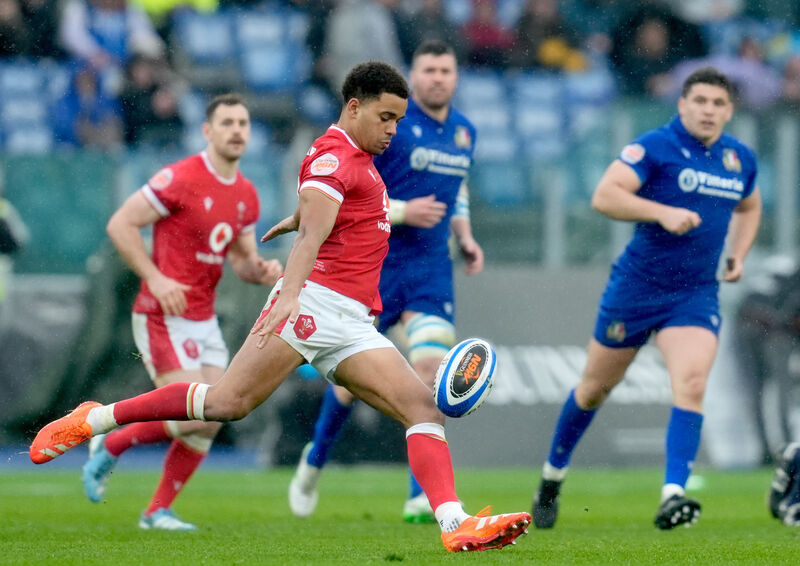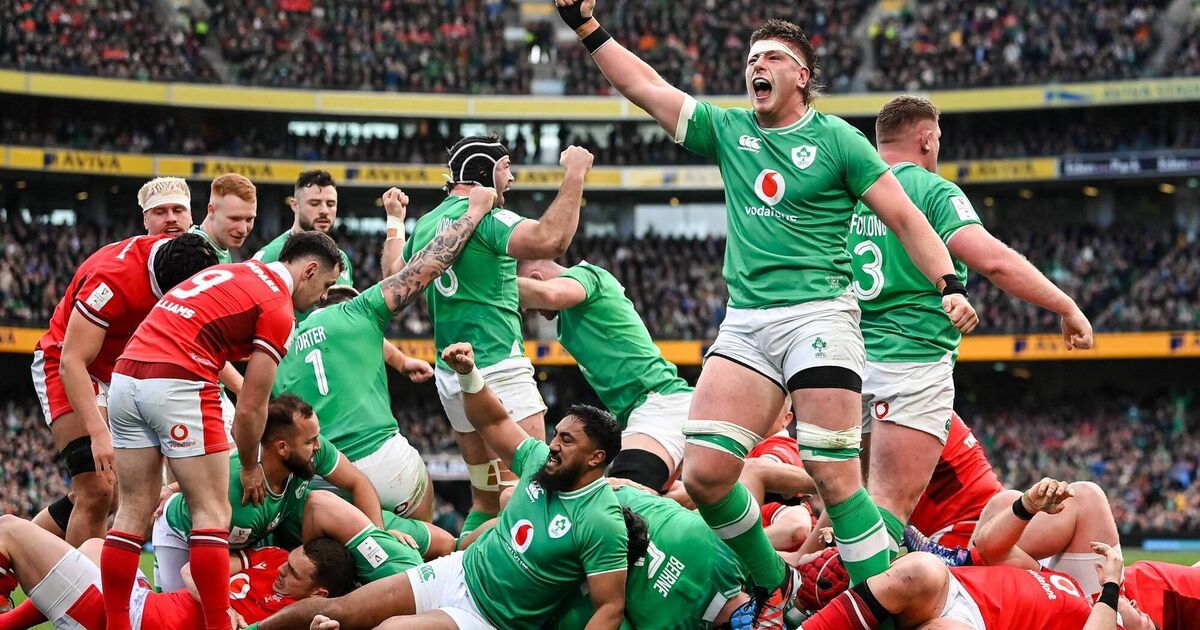Sam Prendergast turns 22 years of age today. With five caps, five wins and a Six Nations player of the match award under his belt, he’s already well ahead of where some of his famed, immediate predecessors were at that stage of their careers.
Ronan O’Gara was a month short of his 23rd birthday when capped for the first time while Johnny Sexton was nowhere near being a regular starter in Leinster colours at Prendergast’s age. The hype will only get bigger from here on in as Prendergast becomes a serious contender for one of the three out half slots Andy Farrell will select for the British and Irish Lions tour of Australia.
Prendergast isn’t the only one riding the crest of a wave at the moment. With a maximum return of 10 points from their opening two Six Nations assignments, the entire Irish squad has good reason to be feeling pretty happy with themselves at this stage.
All the more so given that Farrell, their head coach and spiritual leader, has spent the opening two weekends on the outside looking in. Every time the camera pans in on the big man as he’s seated among the paying public, he looks decidedly uncomfortable.
Just about now, the penny is beginning to drop that his current role with the Lions is at its most uninteresting stage. His time is spent more in the company of Lions sponsors at various functions, fulfilling the least inspiring part of his gig with no hands-on rugby work on the schedule until the squad assemble next June.
You can tell from his body language that he’d much rather be in his green tracksuit, situated at the nerve centre in the coaches’ box, especially given the way Ireland have navigated their way through the opening two games of Six Nations action.
Behind at half-time against England in Dublin, I’ve no doubt, with Ireland on the back foot for large parts of the opening half, Farrell had a few nuggets he’d have loved to present to the players at that point.
The fact that Simon Easterby and his coaching group found all the right messages and, within 10 minutes of the restart, initiated a series of substitutions that had an immediate impact on the outcome of the game places Ireland in a better position to drive on from here.
Even more impressive, given the broadly held opinion that this Scottish team had all the ingredients to carry the fight to Ireland from the off last weekend and the slow start Ireland made against England in Dublin, was the positivity brought right from the outset.
Ireland sprinted out of the blocks and within seven minutes of the kickoff Calvin Nash was sprinting over the Scottish line, almost unopposed, on the end of a sumptuous 25 metre cut out pass from Prendergast.
Ireland made scoring look easy as they manipulated the Scottish defence to such a degree that Nash was left with acres to work in. Scoring tries at this level should be more challenging than that, especially when bodies are at their freshest.
We were entitled to expect more from Scotland. Even before the nasty clash of heads between Finn Russell and Darcy Graham robbed Gregor Townsend of two of his more impactful players, Scotland looked strangely off the pace, forcing things in attack even before players managed to find their second wind.
Later that evening I bumped into Martin Johnson, who was working at the game with the BBC, at Edinburgh airport. Suffice to say he was mightily impressed by Ireland but couldn’t believe how naive Scotland appeared in that opening quarter. I couldn’t agree more.
On the day Ireland were miles superior with so many players performing to such a high standard. The game against England appears to have brought them on leaps and bounds and the manner in which the Irish pack dismantled their Scottish opponents offered a firm reminder that you can have the best back line in the world but if you can’t deliver the right quality of ball then, in a game where defences are now so structured and organised, your chances of making that superiority count are severely diminished.
This was the game where Ireland displayed all their best attributes. The scrum was rock solid throughout, the line out accurate and productive. Ireland’s work at the break-down was top-class with Caelan Doris, Peter O’Mahony and Josh van der Flier totally dominating their Scottish counterparts in the back row in all the key facets of play.
At half back Jamison Gibson-Park, what a campaign he’s had to date, and Sam Prendergast were in total control. Right now the Leinster scrum half provides the perfect foil for Prendergast who is only beginning to come to terms with the demands of Test rugby.
Gibson-Park has the experience and maturity required to direct operations and knows exactly when to give the rookie No 10 his head and when to take the pressure off him. With Bundee Aki or Robbie Henshaw stationed immediately on his outside shoulder, Prendergast is surrounded by a wealth of rugby intelligence.
 Ben Thomas, who started for Wales against France and Italy, is usually an inside centre. Pic: ©INPHO/Matteo Ciambelli
Ben Thomas, who started for Wales against France and Italy, is usually an inside centre. Pic: ©INPHO/Matteo Ciambelli
Contrast that to Dan Edwards, his young counterpart in Wales at present. Three months younger than Prendergast and with just 25 appearances for the Ospreys behind him, Edwards has been thrown in at the deep end winning his first two caps in a struggling set-up off the bench in this Six Nations.
It says even more about where Wales sit at present that the starting out half in the opening games against France and Italy, Cardiff’s Ben Thomas, is primarily an inside centre. Suffice to say, that selection hasn’t worked.
If anything highlights the depths to which Welsh rugby has sunk, it’s the complete shortage of viable options in this key area. When the great Barry John, the architect of the British and Lions first and only ever test series win over New Zealand in 1971, retired prematurely at 27 years of age there was no great panic given that many saw a ready-made replacement in Phil Bennett.
Not only was the Llanelli out half up to the mark but famously steered the Lions home on their unbeaten tour of South Africa in 1974 and captained the Lions three years later in New Zealand. Since that glorious period in Welsh rugby they have never been short on quality in the pivotal role.
The gifted Jonathan Davies was a Lions certainty for the 1989 tour to Australia only for the decision to switch to rugby league with Wigan while Neil Jenkins, Stephen Jones, Gavin Henson, James Hook and Dan Biggar were all included in subsequent Lions touring parties.
On current form it’s pretty certain that no Welsh out half will make Farrell’s squad this summer while I’ve no doubt that both Prendergast and Jack Crowley will be in serious consideration. Crowley probably needs to start a Six Nations game which could happen against Wales.
Finn Russell remains in pole position to start the test series, England’s Fin Smith and namesake Marcus are the other serious contenders for one of the three likely slots available at No 10 in the touring party.
In the vacuum created by the retirement of the great Johnny Sexton, Ireland are fortunate to have two quality options in Prendergast and Crowley with Ciaran Frawley also in contention once he manages to shake off his injury woes. What Wales would give to have those selection dilemmas right now.
Yesterday’s announcement that Warren Gatland has left his position as head coach with immediate effect means that chaos and uncertainty will dominate the build up to the Ireland game on Saturday week, despite confirmation that Cardiff’s Matt Sherratt will fill the role on an interim basis for the remainder of the Six Nations. I doubt if Ireland have ever prepared for a trip to the Principality with Welsh rugby in such disarray.
